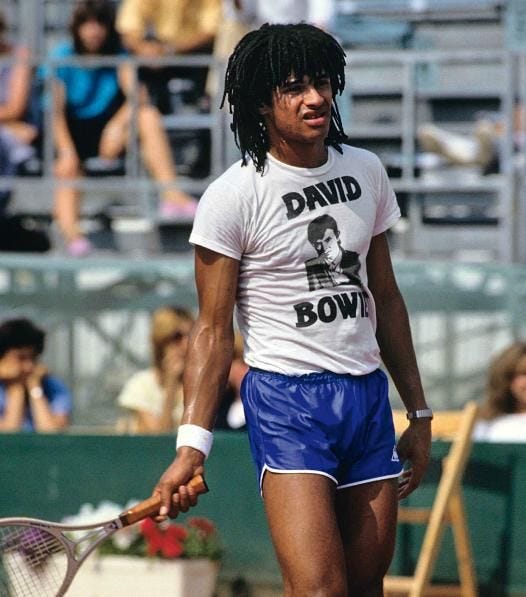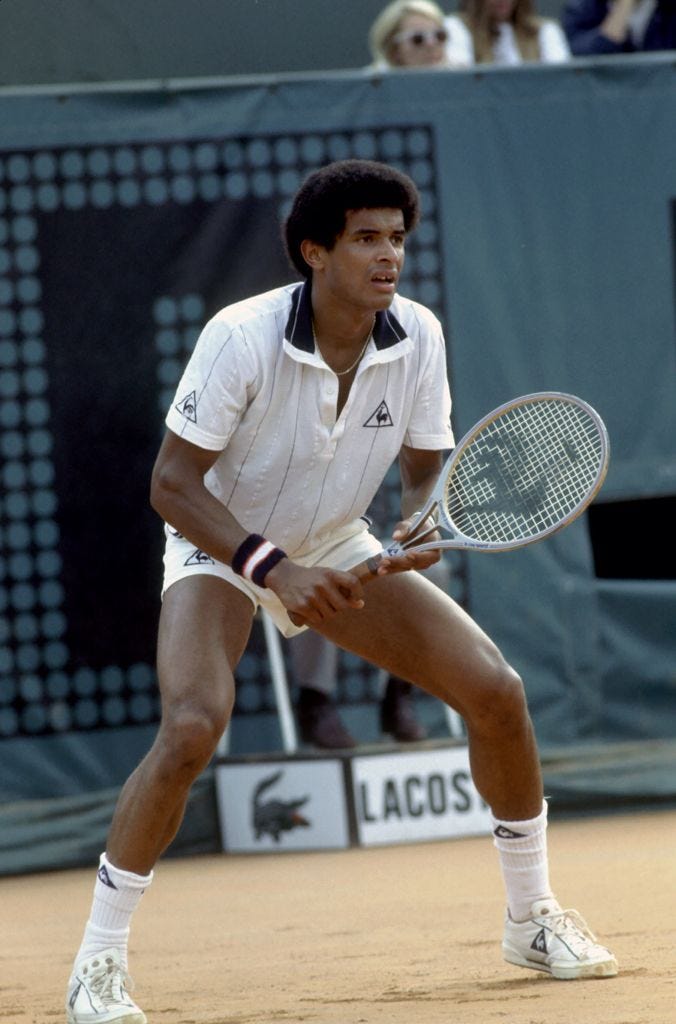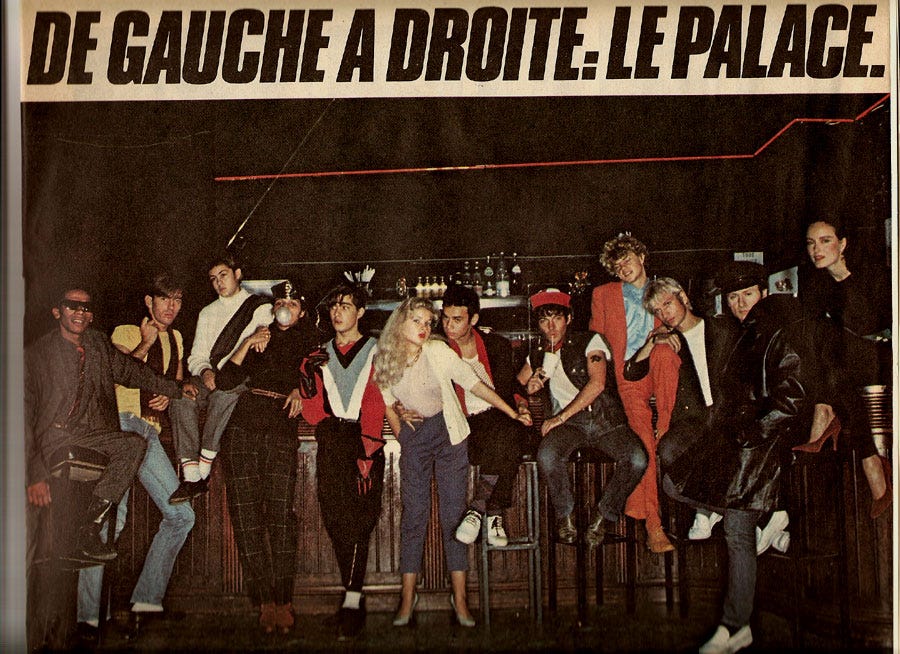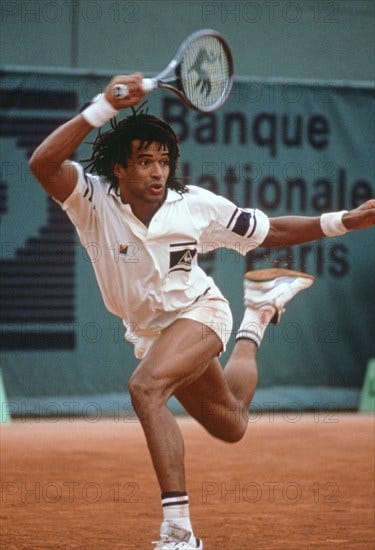📰 Recent News
Miami Open in full swing
Following Indian Wells, the Miami Open has some dramatic storylines with familiar characters including:
Carlos Alcaraz and Daniil Medvedev, two Sunshine Double stalwarts, made opening exits in Miami
Brazilian Fans Left Frustrated After Joao Fonseca Scheduling Chaos at the Miami Open
Miami Open star smokes cigarette courtside and asks the umpire for a lighter
French Open will stream on Max
I include this because this brings me so much happiness. As Ben Rothenberg put it:
“The 2025 French Open will be streaming stateside on Max, a high-quality and reliable app that many culture enthusiasts likely already have.”
The French Open starts May 25, 2025.
🎾 Who is Yannick Noah?
Yannick Noah was a charismatic fan favorite and one of France’s most celebrated cultural figures in the 1980s and 1990s. He rose to international fame in 1983, when he became the first Frenchman in 37 years to win the French Open, a victory that remains iconic in French sports history.
Throughout his career, Noah won 23 singles titles and 16 doubles titles, reaching a career-high singles ranking of world No. 3 in July 1986 and attaining the world No. 1 doubles ranking the following month. In addition to these achievements, Noah also captained the French team to its first Davis Cup victory in 59 years, defeating a heavily favored US team 3–1 in the final in 1991.
👨🎨 Why does he matter?
The purpose of this newsletter isn’t to just talk about his tennis achievements but also how Noah connected tennis to culture as a Black French athlete during a tumultuous time in French history. His career was hugely symbolic in a country grappling with race, colonial history, and national identity.
In the 1980s, France was homogeneously white and still rooted in Eurocentric culture. What it meant to be “French” back then was grounded in traditional values—one that was proud, centralized, and deeply tied to historical ideals. Even though this was true in the 1980s, it still proved to be a complex and transformative decade.
Some big cultural events that were taking place:
François Mitterrand, a Socialist, was elected president in 1981—the first left-wing president of the Fifth Republic. He brought reform surrounding abolition of the death penalty, expansion of workers’ rights, and nationalization of major industries.
France saw increased immigration, specifically from its former colonies in North Africa. This sparked debates around immigration, race, and national identity.
The rise of the far-right, especially the National Front (led by Jean-Marie Le Pen), marked growing backlash and xenophobia.
French cultural output in the 1980s was strong. Cinema, music, radio, and fashion were thriving with auteurs, new wave of progressive youth-oriented media, Parisian chic with punk, electro, and these new international influences.
When you mix this national pride, cultural influence, identity politics, and media expansion France became sports obsessed as well—particularly with football (soccer) and tennis. Sport became a unifying phenomenon and a shared experience among the French as many tuned into events like Tour de France, World Cup qualifiers, and Roland-Garros (French Open).
Enter Yannick Noah…
🇫🇷 1983 Roland-Garros Win
The last Frenchman to win Roland-Garros was Marcel Bernard in 1946, just after World War II. Because France was going through this period of transformation and what it means to be French they were looking for a new hero and a new symbol for unity.
At No. 6 in the world and just 23 years old, Noah seemed like an unlikely French icon due to his race, his dreadlocks, and his barefoot walk onto the court before every match. He born to a Cameroonian father and a French mother in northern France before his father, footballer Zacharie Noah, moved the family back to Africa after Yannick was born. Noah developed his tennis skills in Cameroon only to be discovered by Arthur Ashe and brought back to Nice, France to continue his training at age 11.
Noah was one of the last great serve-and-volley players on clay and this aggressive style was rare on clay. He also was speedy, agile and could beat opponents with athleticism and intuition. He had a great serve and forehand. He took risks. He was a great showman and got the crowd involved. All these skills led him to defeat Swedish reigning champion, Mats Wilander in straight sets: 6–2, 7–5, 7–6. When the match was over he ran into the cheering Parisian crowd to find his father.
Instantly, Noah was put into the national spotlight while challenging conventional ideas of Frenchness and inspiring a generation of young, diverse, and often marginalized French citizens.
🎵 More than a tennis player
Since Noah represented a new face of France, he didn’t shy away from publicly speaking out about race and inequality in French society. His post-tennis career included him leaning into activism and singing. His music mixed African rhythms, French pop, reggae, and messages of unity.
Lastly, I think Yannick Noah is one of the most stylish men’s players ever.
🎤 Shoutouts
🤓 Suggested Read: The Miami Open has been told what is ‘bad’ about the tournament as big problem identified since change of venue
🤓 Suggested Read: Inside the PTPA Lawsuit to Upend Tennis
🤓 Suggested Read: Stalking: Women's sport's grim underbelly








